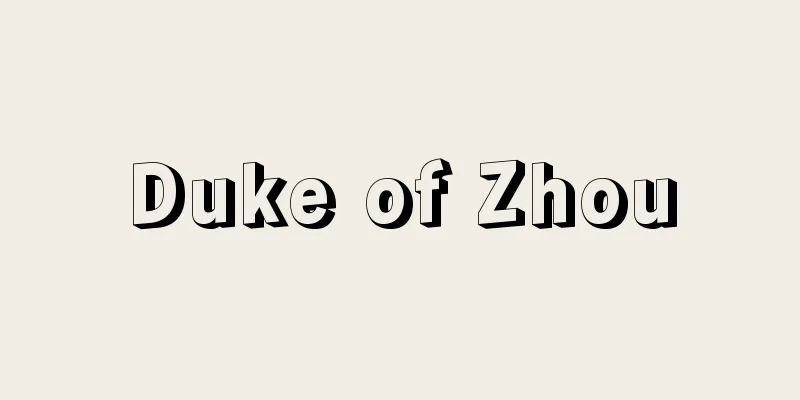Duke of Zhou

|
Date of birth and death unknown. A meritorious official who founded the Zhou Dynasty in China. Lived around the 11th century BC. His name was Dan. Son of King Wen. He helped King Wu destroy Yin, and after King Wu's death, he became regent for King Cheng, who ascended to the throne at a young age (or it is said that he took the throne himself). This led to a rebellion by Wu Geng Lufu, who led the remaining Yin people, and Zhou Gong's younger brothers Guan Shu and Cai Shu. The Duke of Zhou cooperated with Duke Shao to put down the rebellion, and then launched a large expedition to the eastern region. After returning home, the Duke of Zhou built a new capital, Luoyi, in Henan, and settled there himself as a key location for controlling the eastern tribes. After seven years of regency, he returned power to King Cheng. In order to control the Shang people, the Duke of Zhou also feuded King Chu's brother, Weiziqi, to Shangqiu, the former land of the Shang dynasty, making him Duke of Song, and enfeoffed his son Boqin to Lu (Qufu, Shandong Province), thus strengthening the defense of the Zhou dynasty by feuding royal family members and nobles to important places. The Duke of Zhou was later revered as a loyal subject and a saint, and his achievements are celebrated in poems, calligraphy, and inscriptions on bronze vessels. He is also said to have founded ritual music, and the Zhou Rites (a forged book) which describes the Zhou dynasty's system is said to have been written by him. [Akira Utsugi] Source: Shogakukan Encyclopedia Nipponica About Encyclopedia Nipponica Information | Legend |
|
生没年不詳。中国、周王朝創業の功臣。紀元前11世紀ごろの人。名は旦(たん)。文王の子。武王を助けて殷(いん)を滅ぼし、武王の没後、幼少で即位した成王の摂政(せっしょう)となったが(あるいは自ら王位についたともいわれる)、これを機に殷の遺民を率いる武庚禄父(ぶこうろくほ)や、周公の弟である管叔(かんしゅく)・蔡叔(さいしゅく)らが反乱を起こした。周公は召公(奭(せき))と協力してこの乱を鎮め、さらに東方地域の大遠征を行った。帰還後、周公は河南の地に新都洛邑(らくゆう)をつくり、東方諸部族支配の要地として自らここに鎮し、摂政7年にして政権を成王に返したという。周公はまた殷族支配のため、紂王(ちゅうおう)の兄、微子啓を殷の故地商丘に封建して宋(そう)公としたり、子の伯禽(はくきん)を魯(ろ)(山東省曲阜(きょくふ))に封ずるなど、王室一族や功臣を要地に封建して周室の守りを固めた。周公はのち忠臣、聖人として尊崇されるようになり、「詩」「書」や青銅器銘文にその功がたたえられている。また礼楽を創始したともいわれ、周の制度を書いた『周礼(しゅらい)』(偽書)もその作として伝えられる。 [宇都木章] 出典 小学館 日本大百科全書(ニッポニカ)日本大百科全書(ニッポニカ)について 情報 | 凡例 |
Recommend
Bullen, KE (English spelling) BullenKE
...When such calculations are performed for a sta...
Boris Dmitrievich Grekov
A Soviet historian. He studied at the University ...
Tales of the Floating World - Ukiyo Monogatari
A kana zoshi (Japanese folktale). Five volumes, f...
Agriotypidae
...Pilot parasitic wasps lay a much larger number...
Fixed Universal Time - Fixed Universal Time
…Relevant observatories around the world observe ...
Inoko no Kami - Inoko no Kami
...There has been a tradition since the Heian per...
Diocalandra
...They are widely distributed from Amami Oshima ...
Shirane [city] - Shirone
An old city in the north-central part of Niigata P...
Adirondack Mountains - Adirondack Sanctuary
Adirondack Mountains : A mountain range in the nor...
Neodiprion sertifer (English spelling)
...There are reports that the larvae gather on on...
Paracel Islands - Paracel Islands
A group of coral reefs in the southern ocean off t...
Network service
There are two types of network services: "bro...
Iori signboard
〘Noun〙 One of the signs at a Kabuki theater. A woo...
Sendai River
A river that flows north through eastern Tottori P...
Cage-escape
This is an acrobatics trick in which one passes th...









